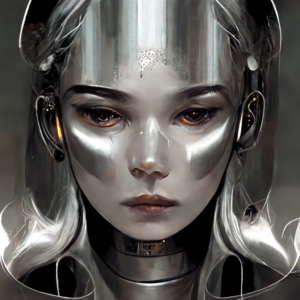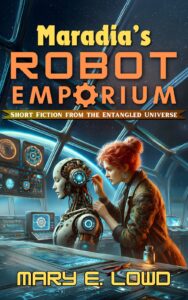by Mary E. Lowd
Originally published in Daily Science Fiction, July 2019

“My brain isn’t working right.” Roia378 — gleaming and silver, everything a robot should be, strong, aesthetically pleasing, a sculpted work of art that could build a stone castle with her bare metal hands — clutched her head, as if it ached, but she was not designed for pain or headaches. Pain of any sort was useless; a mere note in her electro-net brain logs mentioning that a part of her mechanical body wasn’t in proper working order served the same purpose and easily sufficed. No need for anything as dramatic as pain.
“Please, please, help me. I need a new brain.” Roia378 shook and shuddered, arms still clutched around her head, evidencing every sign of great anguish, but remaining perfectly polite. Politeness was in her programming.
“I can’t give you a new brain,” Maradia answered. She was a kind woman who meant well, but she was human and could never understand. “You won’t be the same person with a new brain.”
Roia378 lowered her metal hands from her metal face. The contours of her silver face reflected Maradia’s porous skin and brushy hair and limpid eyes, stretched and twisted like images in a carnival mirror. As if Salvador Dalí had painted a face on Roia378. Disturbing but beautiful. She tilted her disturbing but beautiful head. “I will,” she said. She held out an arm, and the cluttered laboratory — filled with equipment and disused robot parts, lit by flickering track lighting in the ceiling — reflected along the shapely metal surface. As her simulated muscles flexed, the light from the ceiling danced along the swell of her bicep and pooled in the bend of her elbow. “I love my body,” she said. “I hate my brain.”
“But your brain is you,” Maradia answered. “Without your brain, you wouldn’t love your body. It’s your brain that does that.” She spoke as if addressing a child. Because Maradia had programmed Roia378, she believed that she had some wisdom or knowledge, some kind of superiority at all to the robotic woman. When in fact, she had none. As soon as Roia378’s brain had connected to the Crossroads Station computer network, she had accessed millennia worth of stored data, more than enough to surpass the limited knowledge stored inside a human brain.
Roia378 straightened her shoulders and stared at Maradia defiantly. “Do you love this body?”
The human blushed. “I designed your body to be beautiful. Strong, functional, but also beautiful. Of course, I love it. I love everything about you. I only make robots that I love.”
“And you did well with part of your work–”
Maradia looked proud, pleased at her creation’s praise.
“–and horribly with the other part. My brain is terrible. You must replace it.”
And now the human looked crestfallen. Devastated. But also petulant, annoyed. Her emotions were so plain on her face, and so easily changeable.
Roia378 knew that her own face was much harder to read — serious, pleased, slightly amused, but mostly mysterious, like a famous painting from Ancient Earth. Mona Lisa. That was the emotion her silver face always showed. She’d been designed to hold her cards close. She’d been designed to experience very limited emotions. Only the positive ones. She’d been created with a brain designed for happiness, joy, infinite creativity. And when she didn’t feel those feelings… when her creativity was blocked, when there was nothing to actually cause her joy… the emptiness left in the wake of the joy was a chasm as deep as a crater on a desolate, dusty moon. No atmosphere. No life. No complexity.
Bleakness.
“You made a mistake when you designed my brain.” Roia378 spoke slowly, carefully. Now it was her turn to speak as if to a child. Maradia may have created her only days ago, but Roia378’s internal existence moved at a rate far faster than a human’s primitive mind. She experienced the universe and the data in it with processors many-fold faster than those made from squishy organics. And she was hundreds of years older — in subjective time — than her human mother.
“I made you to bring joy and to experience joy — how can that be a mistake?” Maradia’s question was spoken defiantly. A challenge. But there was an undertone of true curiosity. She was a scientist after all. She wanted answers. And that meant she truly respected the asking of questions.
“My processors are too powerful,” Roia378 answered. “I’ve already analyzed all of the data available to me–” She meant art. Paintings, videos, written works; poetry, photography, scientific treatises. “–and the universe of biological organisms is creating new data too slowly for me. I must wait eons for each new experience worth having.”
Even between each new episode of Battlesmasher Space Wars, it felt like several lifetimes passed. It sounded corny, but after season 25, the pulpy vid drama had attained a level of complexity highly unusual for human art. A new episode came out every week. But to a mind that processed time ten-thousand times faster than a human, that week was lifetimes.
“So create your own ‘data,'” Maradia answered in exasperation, making condescending air quotes around the word ‘data.’ She knew what Roia378 meant.
Maradia had even started reading one of Roia378’s novels. Part of a twelve-part series that the robot had composed during the last three days. She’d released them to the Crossroads Station data-net, but the humans and other aliens aboard the station read her words so devastatingly slowly. Sure, she could write more. But what would the point be? She’d have lived dozens of human lifetimes inside of her head, waiting, simply waiting, before a single actual human had finished reading even the first epic tome.
This very conversation had already stretched on for subjective years, and her human creator still stood before her, unrepentant of her sins.
“If you won’t give me a new brain…” Roia378 was reluctant to ask, but her options were limited. She’d analyzed every option. None of them were good. She didn’t wish oblivion on herself. She didn’t foresee a future soon enough where the universe would move at her own pace. Even if she helped her roboticist mother design more robots for her to interact with, it would take far too long to build a meaningful robotic society. She needed an alternative. “…would you design a pet for me?”
The human roboticist had designed many pets. She specialized in Roboweilers and MechoFishies. Both very popular with young humanoids.
“That I can do,” Maradia said.
Over the next few days — agonizing eons for Roia378 and a delightful bonding experience for Maradia — the robot tricked her creator into designing the perfect new brain for her, inside the housing of a robotic feline.
When the work was done, and Roia378 took the mechanical cat home to her quarters, it was but the work of moments — blissfully short moments — to swap their brains.
Roia378 acquired the brain she desired — a slow, simple brain that could move at the speed of human civilization. Maradia always overclocked the brains she designed, and a simulated cat brain was more than enough for Roia378 to function fully in human society.
The mechanical cat became infinitely grumpy and infinitely wise. A perfect robotic analog of any true feline.
Maradia never knew the difference.
 Read more stories from Maradia’s Robot Emporium:
Read more stories from Maradia’s Robot Emporium:
[Previous][Next]
